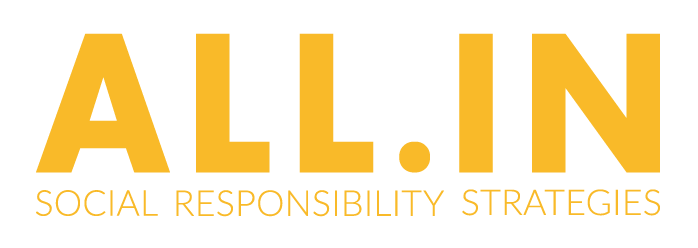SOCIAL RESPONSIBILITY

Social Responsibility Program
What Does It Mean? Why Is It Important To My Business?
These are all questions anyone who owns a business, or in a management position, should not just be asking – they should be answering. According to a study entitled, The Deloitte Global Millennial Survey 2019, “Millennials’ opinions about business continue to diminish, in part due to views that businesses focus solely on their own agendas rather than considering the consequences for society. Fifty-five percent said business has a positive impact on society, down from 61 percent in 2018. More millennials than ever—49 percent—would, if they had a choice, quit their current jobs in the next two years.” It goes on to say, “In addition, millennialsand Gen Zs, in general, will patronize and support companies that align with their values. Younger generations are putting their money where their mouths are when it comes to supporting businesses that make a positive impact on society.”
What Does It Mean?
This means that the largest population of the current workforce (millennials and GenZs) prioritize purpose over profit. As a business owner who writes the checks, you understand that making a profit is why you are in business.However, there is middle ground and an easy and effective way to bridge this gap by implementing a social responsibility program in your company. Chances are you are already giving back in your community,but not in a way that resonates across all generations. How many gala tables have you bought and not filled? How many one-off events have you sponsored in exchange for a logo in the program? There is a better way that not only allows you to make a difference in your community, but also in your company culture –and your bottom line!
Why Is It Important To My Business?
If your bottom line is important to you, then listen up! Baby Boomers did not expect their employers to provide them with a purpose, their purpose was their paycheck. They typically found their purpose outside of the workplace, within their family, church, and/or community organizations. Millennials are not interested in giving their 9-5, or their dime, to businesses that don’t make a difference in our world. According to the study,“They also were more attracted to making a positive impact in their communities or society at large (46 percent) than in having children and starting families (39 percent).” Turn-over of employees are costly. A clearly defined social responsibility program can increase employee retention, attract qualified candidates, and create a cohesive company culture– ALL people want a purpose.
The R.I.V.E.R. Effect
R – Responsibility: Businesses have a responsibility to give back to their community.
I – Investment: Investing resources to bring added value and lasting impact to your community and employees.
V – Value: There is value in investing in their community and seeing it grow and thrive.
E – Empower: Empowering employees to make a bigger difference than they could on their own, as well as empowering the community.
R – Reward: By building your social capital, both the company and the community will see the rewards of the investments for years to come.
The S.T.R.E.A.M. Process
S – Set Up: Define company culture and establish Pillars of Philanthropy.
T – Teams: Create leadership and advisory opportunities.
R – Research: Evaluate charities and organizations that align with company culture.
E – Engage: Create employee centered programs.
A – Action: Implement monthly/quarterly events and opportunities.
M – Messaging: Stream your message internally and externally. Draft and distribute press releases and company-wide communications.





